ASSIGNMENT l PROBLEMATIC SMARTPHONE USE.
Lab report on survey data participant descriptive statistics in the field of personality assessment.
22 Pages4038 Words19 Views
Added on 2022-09-23
ASSIGNMENT l PROBLEMATIC SMARTPHONE USE.
Lab report on survey data participant descriptive statistics in the field of personality assessment.
Added on 2022-09-23
ShareRelated Documents
Running head: PROBLEMATIC SMARTPHONE USE AND PERSONALITY TRAITS 1
HPS307/791 Lab Report Resubmission Information
Number of unique items corrected _______
Description of items corrected:
1. Related to the topic, and a short abstract.
2. Focus on hypothesized variables and those results.
3. Draw from the study and indicate the aim of the research here.
4. Focus on two key factors and discuss their results in relation to previous research. Similarities and
differences.
5. Discuss findings in relation to previous research and utilise the required readings
(add more lines if required)
Comments to your marker (if any):
_____________________________________________________________________________________
_____________________________________________________________________________________
_____________________________________________________________________________________
_____________________________________________________________________________________
_________________________________________________________________
HPS307/791 Lab Report Resubmission Information
Number of unique items corrected _______
Description of items corrected:
1. Related to the topic, and a short abstract.
2. Focus on hypothesized variables and those results.
3. Draw from the study and indicate the aim of the research here.
4. Focus on two key factors and discuss their results in relation to previous research. Similarities and
differences.
5. Discuss findings in relation to previous research and utilise the required readings
(add more lines if required)
Comments to your marker (if any):
_____________________________________________________________________________________
_____________________________________________________________________________________
_____________________________________________________________________________________
_____________________________________________________________________________________
_________________________________________________________________
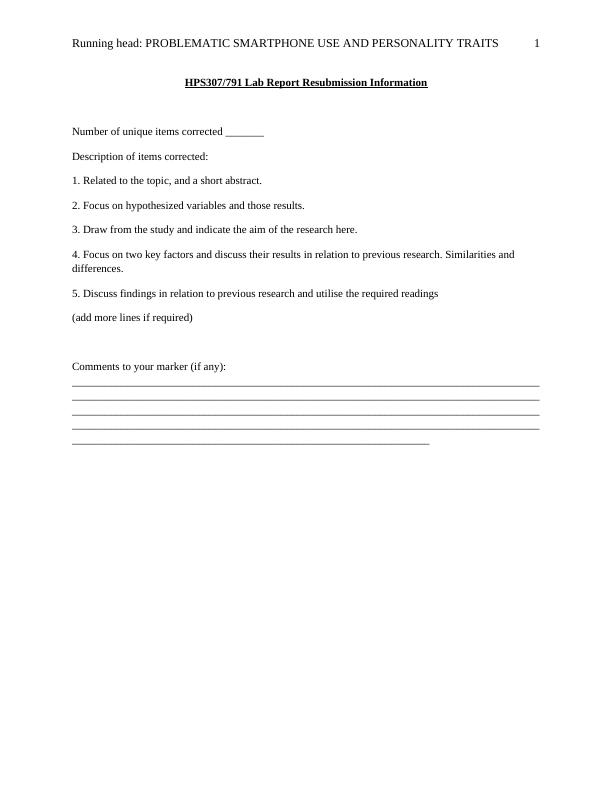
PROBLEMATIC SMARTPHONE USE AND PERSONALITY TRAITS 2
Smartphone Usage and Personality Traits
Name
Professor
Course
Date
Smartphone Usage and Personality Traits
Name
Professor
Course
Date
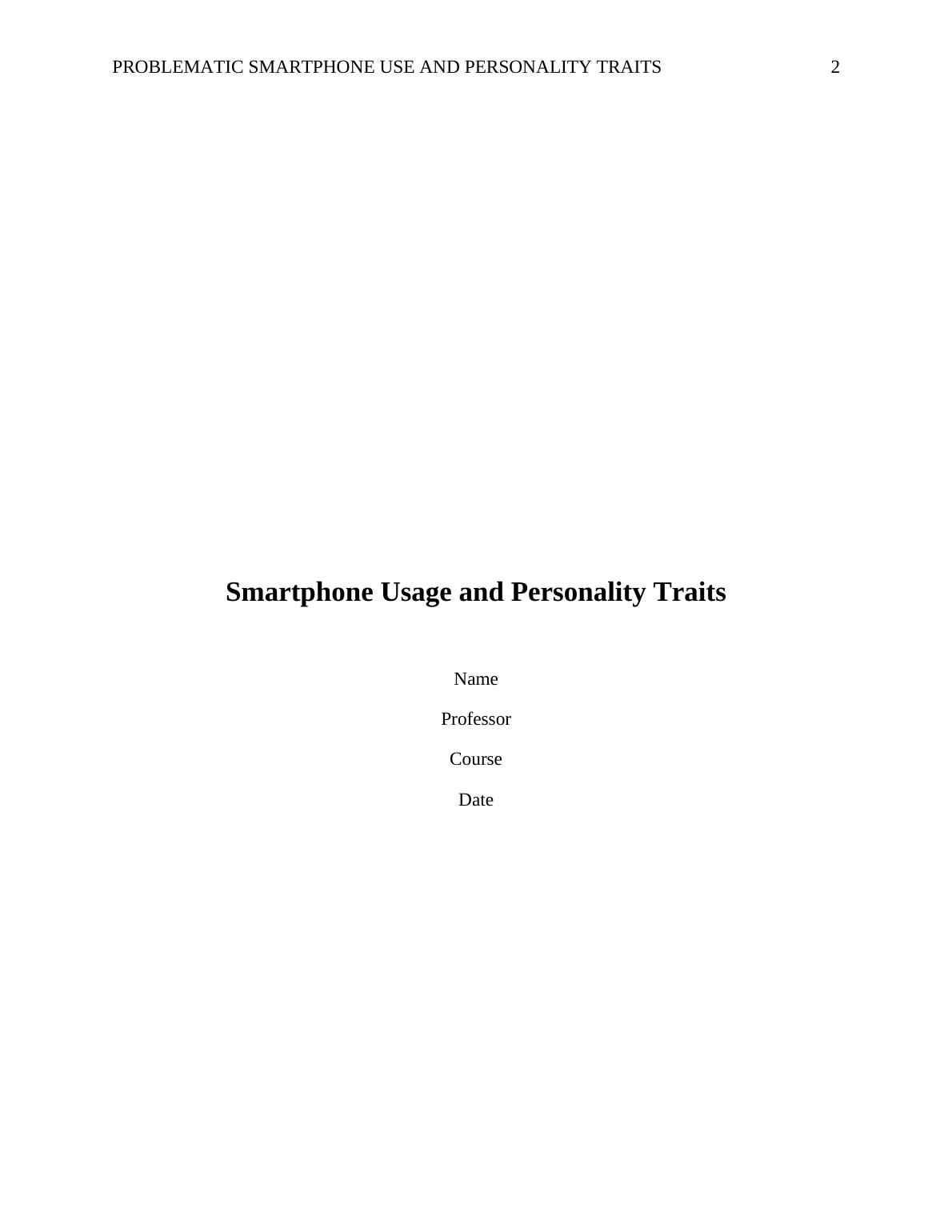
PROBLEMATIC SMARTPHONE USE AND PERSONALITY TRAITS 3
Abstract
The use of intelligent technology has increased dramatically in studies and therapy in recent
years. In real-time information collection and dissemination of internet therapy programs are regularly
used with smartphones and other mobile internet enabled equipment. Intelligent devices have
demonstrated great success in providing individuals with mental health issues with applications and
programs that promote attention, professional support, peer networks and "bite-size" therapeutic videos.
In this sense, intelligent technology can affect well-being positively. So, the issue is here. What are the
possibilities for explaining a increasing trend in smartphone problems? One way to address the issue is to
look at wide personality variables and limited features to see how personality and behaviors relate to the
use of problem-sensitive smartphones. We can also examine research in associated fields, including
studies on behavioral addiction. To study this problem in more detail, we will examine whether the
characteristics that underlie our communication (e.g. emotionality, impression manipulation) are linked to
the problem of smartphone use. Behaviors such as addiction can emerge, including tolerance,
withdrawal and cravings. The addiction to smartphones has been related to decrease in social
functioning, productivity, wellbeing and positive affect. The study collected data related to
smartphone usage from a group of 1079 participants. Out of these 197 were women, 877 were
men, 3 people represented others while 2 people preferred not to disclose their gender identity
during the study.aPeople who have structuredness, substantiveness, talkativeness, thoughtfulness,
authoritarian conversational dominance, questioningness, preciseness, and expressiveness, charm
and unconventionality are less likely to be highly addictive to smartphone use. However those
having traits such as worrisomeness, sentimentality, philosophicalness, tension, defensiveness,
inscrutableness, informality, non-supportiveness, derogatoriness, humour, ingratiation, angriness,
conciseness, argumentativeness, inquisitiveness, and concealingness, emotionality, impression
Abstract
The use of intelligent technology has increased dramatically in studies and therapy in recent
years. In real-time information collection and dissemination of internet therapy programs are regularly
used with smartphones and other mobile internet enabled equipment. Intelligent devices have
demonstrated great success in providing individuals with mental health issues with applications and
programs that promote attention, professional support, peer networks and "bite-size" therapeutic videos.
In this sense, intelligent technology can affect well-being positively. So, the issue is here. What are the
possibilities for explaining a increasing trend in smartphone problems? One way to address the issue is to
look at wide personality variables and limited features to see how personality and behaviors relate to the
use of problem-sensitive smartphones. We can also examine research in associated fields, including
studies on behavioral addiction. To study this problem in more detail, we will examine whether the
characteristics that underlie our communication (e.g. emotionality, impression manipulation) are linked to
the problem of smartphone use. Behaviors such as addiction can emerge, including tolerance,
withdrawal and cravings. The addiction to smartphones has been related to decrease in social
functioning, productivity, wellbeing and positive affect. The study collected data related to
smartphone usage from a group of 1079 participants. Out of these 197 were women, 877 were
men, 3 people represented others while 2 people preferred not to disclose their gender identity
during the study.aPeople who have structuredness, substantiveness, talkativeness, thoughtfulness,
authoritarian conversational dominance, questioningness, preciseness, and expressiveness, charm
and unconventionality are less likely to be highly addictive to smartphone use. However those
having traits such as worrisomeness, sentimentality, philosophicalness, tension, defensiveness,
inscrutableness, informality, non-supportiveness, derogatoriness, humour, ingratiation, angriness,
conciseness, argumentativeness, inquisitiveness, and concealingness, emotionality, impression
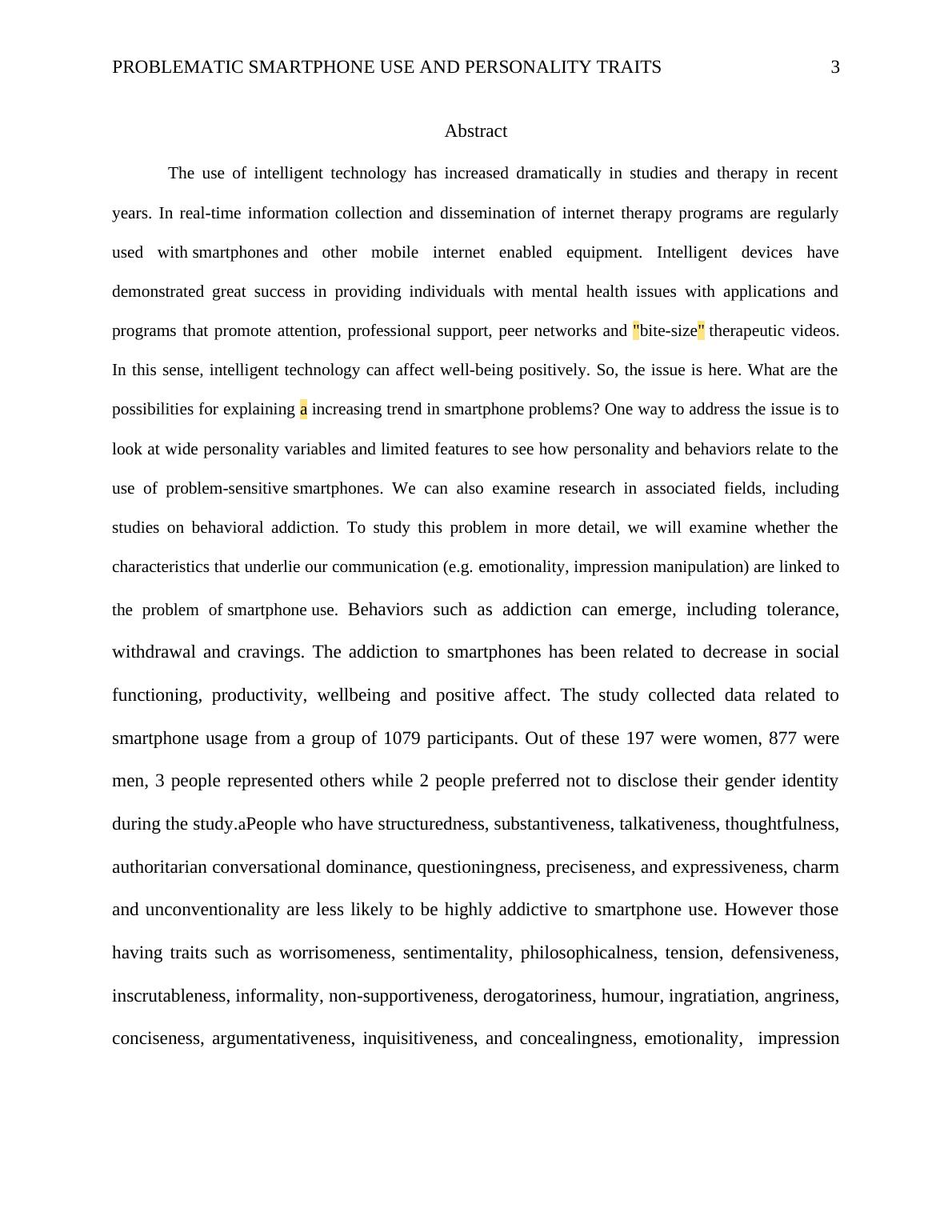
PROBLEMATIC SMARTPHONE USE AND PERSONALITY TRAITS 4
manipulativeness and verbal aggressiveness have a high likelihood of getting addicted to
smartphone use.
manipulativeness and verbal aggressiveness have a high likelihood of getting addicted to
smartphone use.
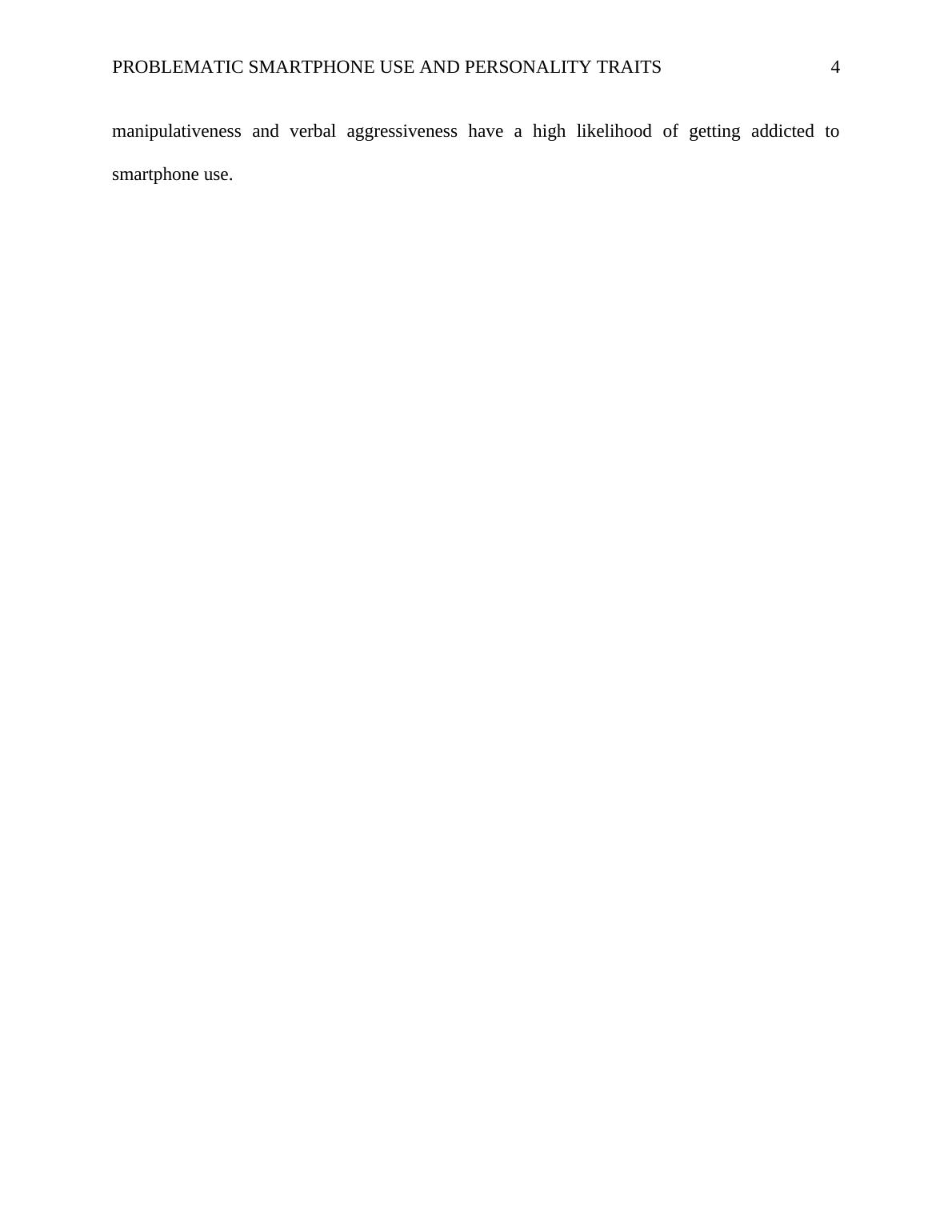
PROBLEMATIC SMARTPHONE USE AND PERSONALITY TRAITS 5
Introduction
Over the recent years, smart technology usage in therapy and research has increased
significantly. Smartphones and other related internet-enabled devices are used routinely in real-
time collection of data and online therapeutic program dissemination. The smart devices have
proved to be highly successful in the support of people who have mental health concerns with
programs and apps that have been designed to support peer and professional networks, encourage
mindfulness and the ‘bite size’ videos related to therapy (De Vries, Bakker-Pieper, Konings, &
Schouten, 2013). In this case, smartphone technologies may have a positive effect on wellbeing.
However, over the past decade a completely novel social and individual issue has emerged,
known as problematic smartphone use. Other terms used for this issue include smartphone
addiction, screen addiction or internet addiction. The easy access to online world and social
media continues to be a normal and ubiquitous part of life. However, people’s consumption of
the internet based media is not near what may be considered normal. For instance, in Australia
relevant data on the issue indicates that; approximately 88 per cent of the citizens own
smartphones (Horwood, & Anglim, 2018). Approximately 94 per cent of the Australian
adolescents own smartphones. Currently, the Australian households have over 9 devices on
average, which are internet-connected (Goldberg, et al. 2006). Approximately 35 per cent of the
Australians check their phones within five minutes in the morning after waking up while 70 per
cent of Australian people use their phones during the meal times with friends and family (Hunter,
et al. 2017). By average, the Australians normally check their smartphones for 35 minutes every
day (Horwood, & Anglim, 2018). This paper seeks to evaluate the connection between
problematic smartphone usage and personality traits.
Introduction
Over the recent years, smart technology usage in therapy and research has increased
significantly. Smartphones and other related internet-enabled devices are used routinely in real-
time collection of data and online therapeutic program dissemination. The smart devices have
proved to be highly successful in the support of people who have mental health concerns with
programs and apps that have been designed to support peer and professional networks, encourage
mindfulness and the ‘bite size’ videos related to therapy (De Vries, Bakker-Pieper, Konings, &
Schouten, 2013). In this case, smartphone technologies may have a positive effect on wellbeing.
However, over the past decade a completely novel social and individual issue has emerged,
known as problematic smartphone use. Other terms used for this issue include smartphone
addiction, screen addiction or internet addiction. The easy access to online world and social
media continues to be a normal and ubiquitous part of life. However, people’s consumption of
the internet based media is not near what may be considered normal. For instance, in Australia
relevant data on the issue indicates that; approximately 88 per cent of the citizens own
smartphones (Horwood, & Anglim, 2018). Approximately 94 per cent of the Australian
adolescents own smartphones. Currently, the Australian households have over 9 devices on
average, which are internet-connected (Goldberg, et al. 2006). Approximately 35 per cent of the
Australians check their phones within five minutes in the morning after waking up while 70 per
cent of Australian people use their phones during the meal times with friends and family (Hunter,
et al. 2017). By average, the Australians normally check their smartphones for 35 minutes every
day (Horwood, & Anglim, 2018). This paper seeks to evaluate the connection between
problematic smartphone usage and personality traits.
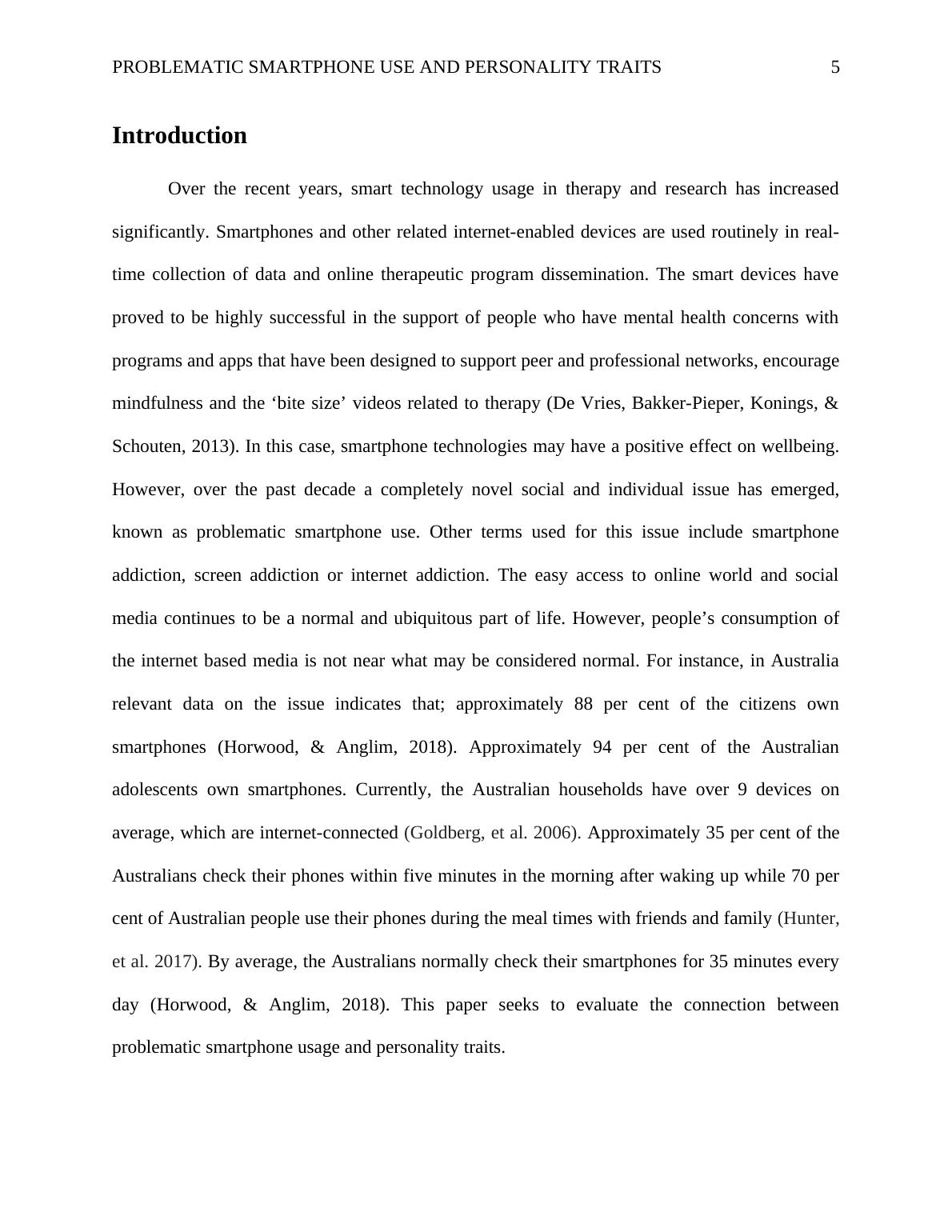
PROBLEMATIC SMARTPHONE USE AND PERSONALITY TRAITS 6
Research Question
At the moment, people are living in a world of screen users. However, the excessive use
of screens has become problematic to some people. Behaviors such as addiction can emerge,
including tolerance, withdrawal and cravings. The addiction to smartphones has been related to
decrease in social functioning, productivity, wellbeing and positive affect (Lee, & Ashton, 2004).
For the case, of adolescents, the potential effects of screen addiction such as social skills
development, neurological development and formation of intimate relationship may not be
known for several years in future. Living amidst a social paradigm that is completely new, one
way for approaching the issue involves looking broadly at personality factors such as
neuroticism and narrow personality traits such as the communication style (Kwon, et al. 2013).
This process helps to see whether there is any relationship between behaviors associated with
smartphone addiction and personality. This process would thus help to understand why different
people have varied tendencies of addiction to smartphone usage and how to deal with the impact.
Literature review
Personality involves stable set of tendencies and characteristics that determine the
differences and commonalities in feelings, actions and thoughts among people. Various
individual traits exist but most research has focused on the big five personality traits such as
conscientiousness, neuroticism, extraversion, openness to experience and agreeableness
(Samaha, & Hawi, 2016). The characteristics theoretically capture the essence of the character of
an individual. Studieshave shown that these factors form the most parsimonious and
comprehensive personality model. They also form the taxonomy that is quite useful in
personality studies. The model has also been considered to be the best model among researchers
Research Question
At the moment, people are living in a world of screen users. However, the excessive use
of screens has become problematic to some people. Behaviors such as addiction can emerge,
including tolerance, withdrawal and cravings. The addiction to smartphones has been related to
decrease in social functioning, productivity, wellbeing and positive affect (Lee, & Ashton, 2004).
For the case, of adolescents, the potential effects of screen addiction such as social skills
development, neurological development and formation of intimate relationship may not be
known for several years in future. Living amidst a social paradigm that is completely new, one
way for approaching the issue involves looking broadly at personality factors such as
neuroticism and narrow personality traits such as the communication style (Kwon, et al. 2013).
This process helps to see whether there is any relationship between behaviors associated with
smartphone addiction and personality. This process would thus help to understand why different
people have varied tendencies of addiction to smartphone usage and how to deal with the impact.
Literature review
Personality involves stable set of tendencies and characteristics that determine the
differences and commonalities in feelings, actions and thoughts among people. Various
individual traits exist but most research has focused on the big five personality traits such as
conscientiousness, neuroticism, extraversion, openness to experience and agreeableness
(Samaha, & Hawi, 2016). The characteristics theoretically capture the essence of the character of
an individual. Studieshave shown that these factors form the most parsimonious and
comprehensive personality model. They also form the taxonomy that is quite useful in
personality studies. The model has also been considered to be the best model among researchers
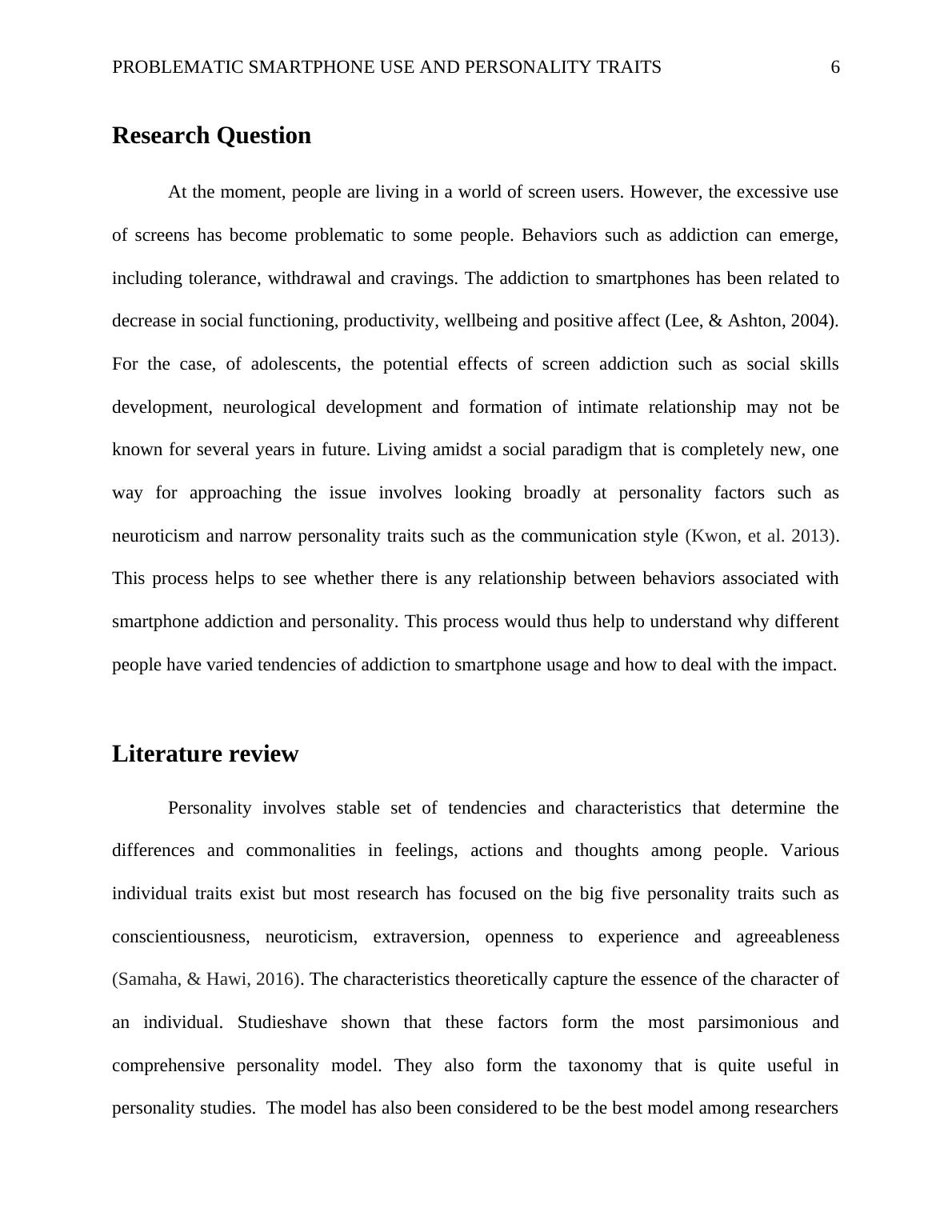
End of preview
Want to access all the pages? Upload your documents or become a member.
Related Documents
HPS307 AT 1 | Lab Report | The Role of Problematic Smartphone Use and Emotional Intelligencelg...
|19
|3376
|48
Research Proposallg...
|11
|2082
|69
Scholarly Reflection On Developmentlg...
|8
|2585
|172
Critical Appraisal of Cognitive Therapy for Psychiatric Disorderslg...
|12
|2481
|306
Introduction to Information Technology: Types of Software, Network Technologies, and Artificial Intelligencelg...
|14
|4125
|275
